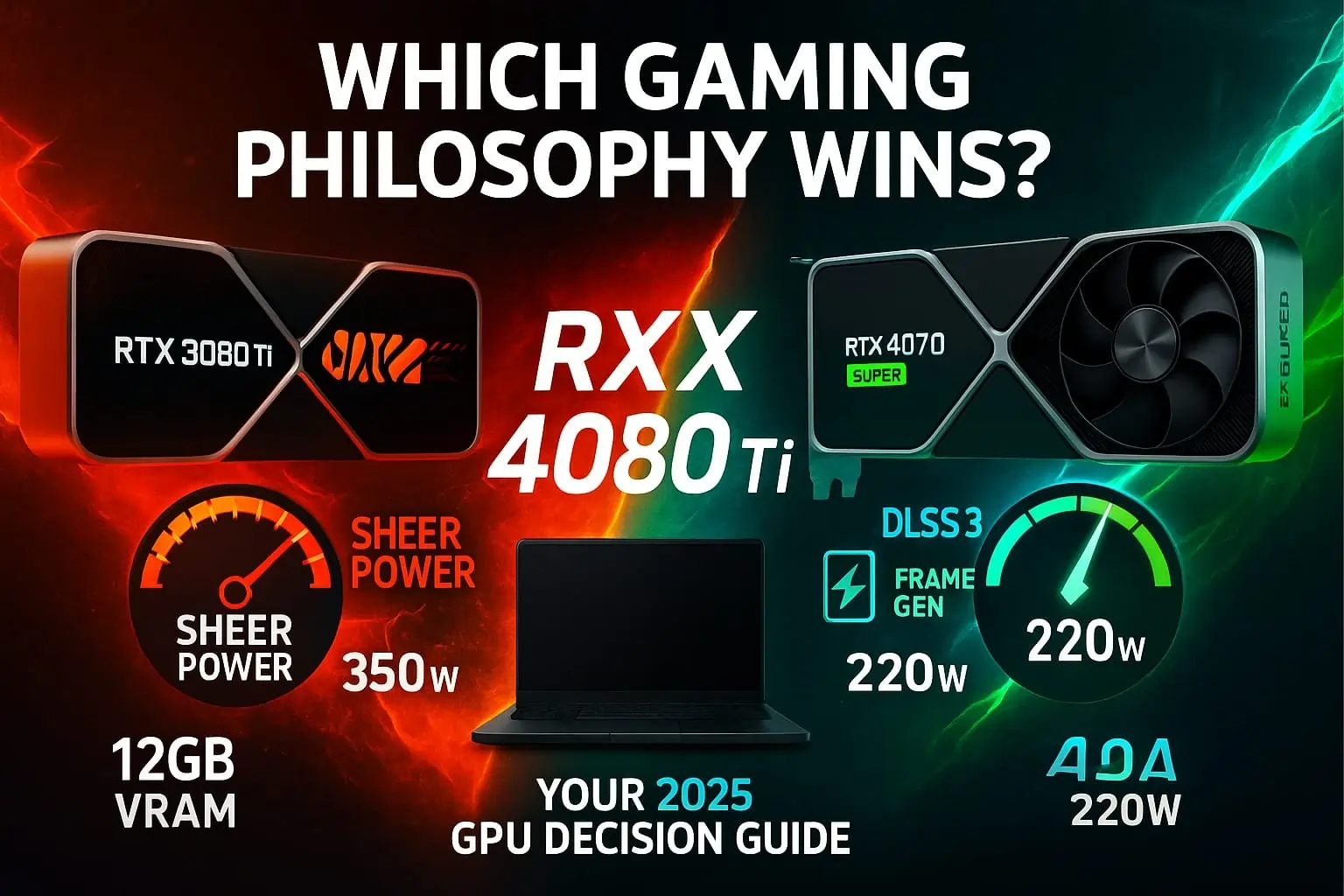If you’re upgrading your gaming PC in 2025, you’ve probably hit a common dilemma: RTX 4070 Super vs 3080 Ti. Both GPUs are powerhouses, but they shine in different ways. One is a modern, efficient Ada Lovelace card with DLSS 3, while the other is an older but raw-performance-heavy Ampere beast.
So, which one should you pick? Let’s dive into benchmarks, architecture, VRAM, power draw, and real-world gaming results to find out.
Architecture: Ada Lovelace vs Ampere
- RTX 4070 Super → Built on NVIDIA’s Ada Lovelace (5nm) architecture, with advanced AI features, DLSS 3 support, and efficiency gains.
- RTX 3080 Ti → Powered by the older Ampere (8nm) design. It still packs brute force, but misses newer tech like frame generation.
Here, 4070 Super (more modern and future-proof) is clear winner among them.
Gaming Performance: 1440p and 4K Benchmarks
- At 1440p → The RTX 4070 Super often wins thanks to DLSS 3. Games like Cyberpunk 2077 and Alan Wake 2 run smoother with frame generation enabled.
- At 4K → The RTX 3080 Ti holds its ground in rasterized games. Its wider memory bus gives it a slight edge in texture-heavy titles like Red Dead Redemption 2.
Verdict:
- For 1440p gamers → Go with 4070 Super.
- For native 4K players → The 3080 Ti is still a strong choice.
VRAM and Memory Bandwidth:
Both cards ship with 12GB of GDDR6X VRAM, but:
- 4070 Super → 192-bit bus (504 GB/s bandwidth).
- 3080 Ti → 384-bit bus (912 GB/s bandwidth).
This makes the 3080 Ti better for ultra 4K textures and heavy workloads like 3D rendering.
✅ Winner: 3080 Ti
Ray Tracing & DLSS Performance
- 4070 Super → Supports DLSS 3 with frame generation, delivering big FPS gains in supported titles.
- 3080 Ti → Limited to DLSS 2, still great but lacks AI frame generation.
✅ Winner: 4070 Super (DLSS 3 is a game-changer).
Power Efficiency & Thermals
- 4070 Super → ~220W TDP → runs cooler, quieter, and needs only a 650W PSU.
- 3080 Ti → ~350W TDP → runs hotter, louder, and usually requires an 850W PSU.
✅ Winner: 4070 Super
Pricing & Value in 2025
- RTX 4070 Super → $599–$699 new (with warranty).
- RTX 3080 Ti → $700–$900 used (no warranty, older tech).
✅ Winner: 4070 Super (better price-to-performance ratio in 2025).
Quick Comparison Table
| Feature | RTX 4070 Super | RTX 3080 Ti |
|---|---|---|
| Architecture | Ada Lovelace (5nm) | Ampere (8nm) |
| VRAM | 12GB GDDR6X | 12GB GDDR6X |
| Memory Bus | 192-bit (504 GB/s) | 384-bit (912 GB/s) |
| DLSS | DLSS 3 (Frame Gen) | DLSS 2 |
| TDP | 220W | 350W |
| PSU Needed | 650W | 850W |
| Price (2025) | $599–$699 (new) | $700–$900 (used) |
Who Should Buy Which GPU?
Choose RTX 4070 Super If You:
- Play at 1440p or use DLSS 3 for smooth 4K.
- Want a quieter, cooler, more efficient GPU.
- Need AV1 encoding for streaming/content creation.
- Prefer buying new with warranty.
Choose RTX 3080 Ti If You:
- Find it below $600 in the used market.
- Play mostly native 4K rasterized games.
- Already own a high-wattage PSU and don’t mind power draw.
Final Thoughts:
The RTX 4070 Super is the smarter buy for most gamers in 2025. It’s efficient, modern, and built for the future with DLSS 3. However, if you’re a bargain hunter and manage to snag a cheap 3080 Ti, it can still deliver excellent 4K performance.
👉 Best choice for:
- Best for 1440p + next-gen features → RTX 4070 Super
- Best for raw 4K rasterization (used) → RTX 3080 Ti
FAQs: 4070 Super vs 3080 Ti
Q1: Is the RTX 4070 Super better than the RTX 3080 Ti at 1440p?
Yes. With DLSS 3 and better efficiency, the 4070 Super wins at 1440p gaming.
Q2: Should I upgrade from 3080 Ti to 4070 Super?
Only if you want DLSS 3, AV1 encoding, and lower power draw. Otherwise, stick with the 3080 Ti.
Q3: Which GPU is more future-proof?
The 4070 Super, thanks to Ada Lovelace architecture and DLSS 3 support.
Q4: Does DLSS 3 really improve performance?
Yes. In supported games, DLSS 3 can double frame rates by generating AI-powered frames.
Q5: Which GPU offers better value in 2025?
The 4070 Super—it’s cheaper, efficient, and comes with warranty support.


An excellent and thoughtful piece.